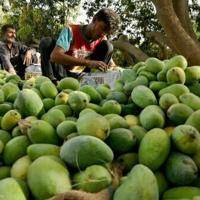Farmers in Pakistan are pointing to climate change as the cause of parasites and extreme weather that are damaging this season’s mango crop, a source of national pride and income.
Farmer Muhammad Yusuf, wearing a white and orange scarf to shield himself from the heat, expressed concern over the erratic weather patterns. An extended winter was followed by an extremely wet April, and now the country is facing a heatwave with temperatures reaching up to 52 degrees Celsius (126 degrees Fahrenheit).
Yusuf, who has dedicated half his life to growing mangoes, explained, “Buds didn’t flower on time, many buds just died. Those that started growing were infected with (parasite) black hopper.”
Over 60 years old now, Yusuf believes “climate change has wreaked havoc” in his village of Tando Allahyar, located approximately 200 kilometres (124 miles) northeast of Karachi.
Pakistan is a major mango producer, with agriculture contributing almost a quarter of its GDP. In Tando Ghulam Ali, another mango-growing area, orchard manager Arsalan observed a 15 to 20 percent loss in production due to the damage caused by weather conditions and parasites.
According to mango grower and exporter Ziaul Haq, the attacks on fruit by pests are unprecedented and have led to increased spending on pesticides. The excessive use of chemicals has become common in mango-growing regions like Sindh and Punjab.
Farmers have been struggling since 2022 when severe heatwaves and flooding hit the country, leading to declining crop yields. The Pakistan Federation of Fruit and Vegetable Exporters Association reported significant losses in mango exports last year.
The income loss from a poor harvest could have a detrimental impact on the country, particularly as it seeks a loan from the IMF. Workers like Mashooq Ali are worried about earning less this year and are looking for government support to cope with the challenges.





